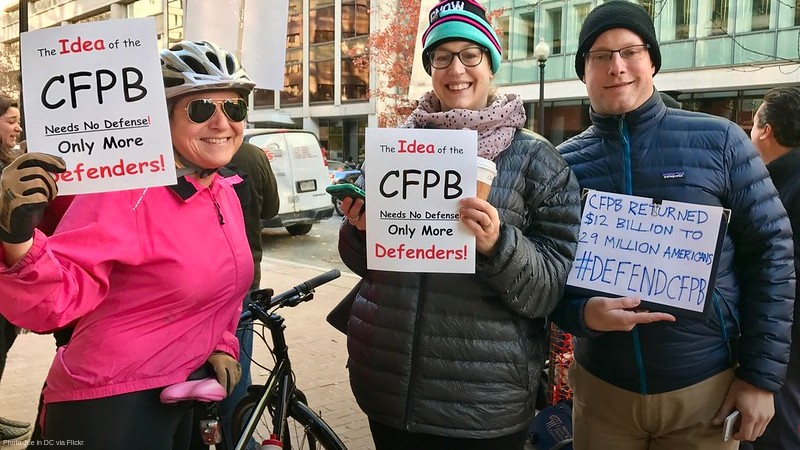In the final weeks before a new U.S. administration took office, federal agencies rushed to enact last-minute consumer protection measures. This flurry of activity has raised concerns that the regulatory safeguards many Americans rely on may soon be weakened or dismantled. As financial institutions and businesses push for deregulation, consumers may face increased risks of fraud, unfair lending practices, and weakened oversight of essential industries.
The Consumer Financial Protection Bureau (CFPB), in particular, played a key role in enforcing regulations aimed at protecting individuals from corporate misconduct. However, with new leadership in place, the future of these protections remains uncertain.
Key Takeaways
Consumer protections are at risk due to potential deregulation under new leadership, raising concerns about increased financial risks for Americans.
- Federal agencies rushed to enact last-minute consumer protection measures before a change in administration, highlighting uncertainty over future regulations.
- Key actions by the Consumer Financial Protection Bureau (CFPB) included addressing unfair practices in finance and retail, such as kickbacks from Rocket Mortgage and inaccurate credit reporting by Equifax.
- Consumer advocates warn that reduced oversight could lead to increased predatory lending and higher costs for consumers, particularly affecting seniors and low-income tenants.
Key consumer protections before the transition
As the administration changed, regulatory agencies issued several critical rulings affecting consumers across multiple industries.
Financial oversight and banking regulations
The Consumer Financial Protection Bureau (CFPB) took decisive action against several financial institutions to address unfair practices that harmed consumers.
One major case involved Rocket Mortgage, which was sued for allegedly offering illegal kickbacks to real estate agents in exchange for referrals. This practice undermined fair competition and potentially led to higher costs for homebuyers.
Capital One also came under scrutiny after the CFPB accused the bank of withholding over $2 billion in interest payments from savings account holders. This case highlighted concerns about transparency and fair treatment in the banking sector.
Equifax and Experian were penalized for failing to investigate consumer complaints, leading to inaccurate credit reports with serious financial consequences. Cash App was also ordered to return $120 million to users after a $175 million settlement due to fraud prevention failures.
Honda Finance faced a $12.8 million fine for reporting incorrect credit data affecting 300,000 customers’ loan approvals and interest rates. These actions highlight the CFPB’s role in enforcing fair financial practices.
Consumer protection in retail and digital payments
Beyond banking, regulators also cracked down on unfair practices in retail and online payment platforms.
Walmart delivery drivers: The CFPB took action to prevent Walmart from forcing drivers into restrictive deposit accounts that harmed their financial stability.
Buy Now, Pay Later (BNPL) risks: A study revealed that one in five consumers rely on BNPL services, with young adults (ages 18-24) being the most frequent users, raising concerns about rising debt levels.
Medical debt credit protections: The bureau prevented unpaid medical bills from negatively impacting consumer credit scores, offering relief to millions struggling with healthcare expenses.
Public health and environmental safety
Other agencies also implemented key policies aimed at consumer well-being. The Federal Trade Commission (FTC) investigated pharmacy benefit managers for contributing to rising medication costs.
The Food and Drug Administration (FDA) proposed clearer nutrition labels, highlighting percentages of saturated fat, salt, and sugar to help individuals make healthier choices. Lastly, the Environmental Protection Agency (EPA) officially recognized the health risks of long-lasting toxic chemicals in drinking water.
Political divide over consumer protections
The CFPB, established after the 2008 financial crisis, has long been a point of contention between political parties. While Democrats championed the bureau’s efforts to regulate financial institutions and protect consumers, many Republicans viewed it as an overreach of government power.
A shift in leadership and policy
Upon taking office, the new administration swiftly replaced the CFPB director and ordered a freeze on several ongoing investigations and policy changes. Business leaders, including Elon Musk, openly called for dismantling the agency, arguing that its regulations stifled economic growth. Financial institutions welcomed the change, as they had long viewed the bureau’s strict oversight as burdensome.
Consumer advocates warn that these rollbacks could lead to serious consequences. Julie Krawczyk, director of the Senior Source’s Elder Financial Safety Center, cautions that reduced oversight may result in increased predatory lending. She emphasizes that seniors, in particular, will have fewer avenues to file complaints or recover financial losses.
The future of financial consumer rights
With the CFPB’s future uncertain, several key consumer rights are at risk.
Restrictions on overdraft fees: The bureau previously worked to limit excessive overdraft charges by banks, but new leadership may reverse these policies.
Regulation of rent and late fees: A study found that rental late fees have risen to as high as $85, prompting concerns about affordability for low-income tenants.
Military and student loan protections: The bureau’s past investigations highlighted higher interest rates for military personnel and errors in student loan repayment systems. If enforcement efforts decline, borrowers may face greater financial hardships.
The level of consumer protection in the coming years will largely depend on legislative actions and judicial rulings under the new leadership. While some states may enforce stricter local regulations, the absence of strong federal oversight will require consumers to take a more proactive approach in safeguarding their financial interests.
How consumers can protect themselves
As regulations weaken, consumers must take steps to protect themselves. Regularly checking credit reports can help catch errors and prevent financial issues. Reading loan and rental terms carefully can also prevent hidden fees and unexpected costs.
Choosing reputable banks and lenders reduces the risk of predatory practices. Additionally, supporting consumer rights groups and advocacy efforts can help maintain strong financial protections.
The full impact of these regulatory changes will become clearer in the coming months. While some consumer protections remain in place, the aggressive enforcement seen in recent years may soon be a thing of the past.














